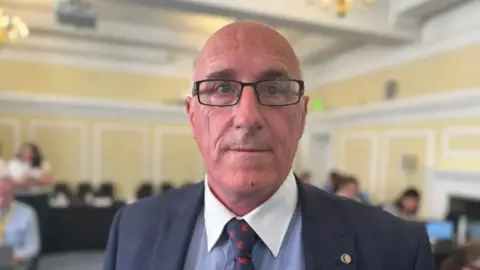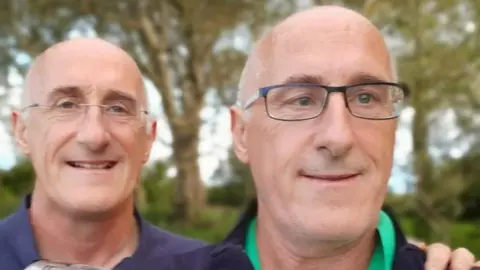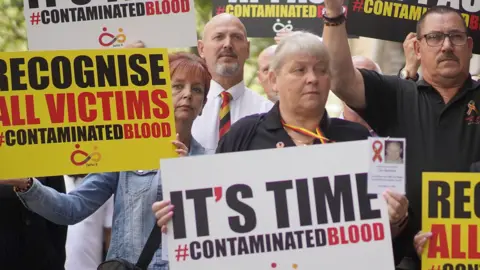Infected blood compensation process created 'tier of victimhood'
 BBC
BBCA man, from Northern Ireland, who contracted hepatitis C has told the Infected Blood Inquiry the compensation process created a tier of victimhood which is "immoral, corrupt and unacceptable".
Nigel Hamilton, who is also chairman of Haemophilia NI, received contaminated blood products during an operation in the 1970s.
He gave evidence to the inquiry amid concerns around the government's compensation process for victims.
His twin brother Simon, who died on Christmas Day in 2023, also contracted Hepatitis C after being given contaminated transfusions.
More than 30,000 people in the UK were infected with HIV and hepatitis C after they were given contaminated blood and blood products between the 1970s and early 1990s.
In August 2022, the government announced that 4,000 UK victims would receive interim payments of £100,000, including about 100 in Northern Ireland.
But campaigners and victims have since contacted the inquiry with concerns about the way compensation is being implemented, and how long the process is taking.
Mr Hamilton has received his compensation but wants to remain involved in the process to ensure that everyone gets justice.
'A process of delay'

Giving evidence, Mr Hamilton thanked the inquiry and its chair for the "opportunity to repeat that we need justice".
He was questioned by chief counsel to the Inquiry, Jenni Richards KC about the delay of compensation and its impact upon those in Northern Ireland.
Mr Hamilton said it was "not only in Northern Ireland" but that it impacted people "right across the board".
In addressing the inquiry's recommendations, he said "the outcome that has taken place is not how it was meant to be".
"The issue should be dealt with and should have been dealt with efficiency and in collaboration with victims.
"That's how it should have been.
"There's been a process of delay brought about by exclusion," he said.
'Really anxious'
He explained the "big anxiety that people feel" is the lack of direct consultation and that "victims don't know when they're going to be involved in this process".
"Their anxiety rises. Their fear and feeling of resentment and rejection rises," he said.
Mr Hamilton described the emotional, psychological, and financial impact of the process as "cruel, and the torture continues" and it needed properly addressed and resolved.
"My own personal feeling, while I have received compensation, is that it is critical that we widen the aperture of the funnel and get as many people in as possible to ensure that justice is done and that answers are given," he said.
Mr Hamilton said in his opinion: "The simple issue here is the money was supposed to be provided. Put the money where the mouth is and get it done."
'Far too long'
 PA Media
PA MediaEarlier, Mr Hamilton told BBC's Good Morning Ulster programme that the need to deliver compensation payments is "paramount".
"We've already lost a number of people. I've lost a twin brother, two cousins, several friends, one more recently, in the last few months and this is an injustice to them."
"It does not provide for them the opportunity to see closure and they have lost out in this process which has just simply taken far too long," he added.
'It's not over for me'
"People need the justice that they are entitled to. We have faced a long time in getting justice," he said.
The "reluctance" for the process to "move forward at pace" is "frustrating", he said.
"Justice is justice. It must be delivered – and it must be delivered now."
Mr Hamilton's compensation process took about five weeks and he said it was not straightforward, so he wants to ensure it progresses for others.
"My objective for staying in this process, rather than taking my money and running, is that I want to see justice for all other victims."
"I'm now in a situation where I am through this process – but it's not over for me – I want justice for everyone," Mr Hamilton said.
